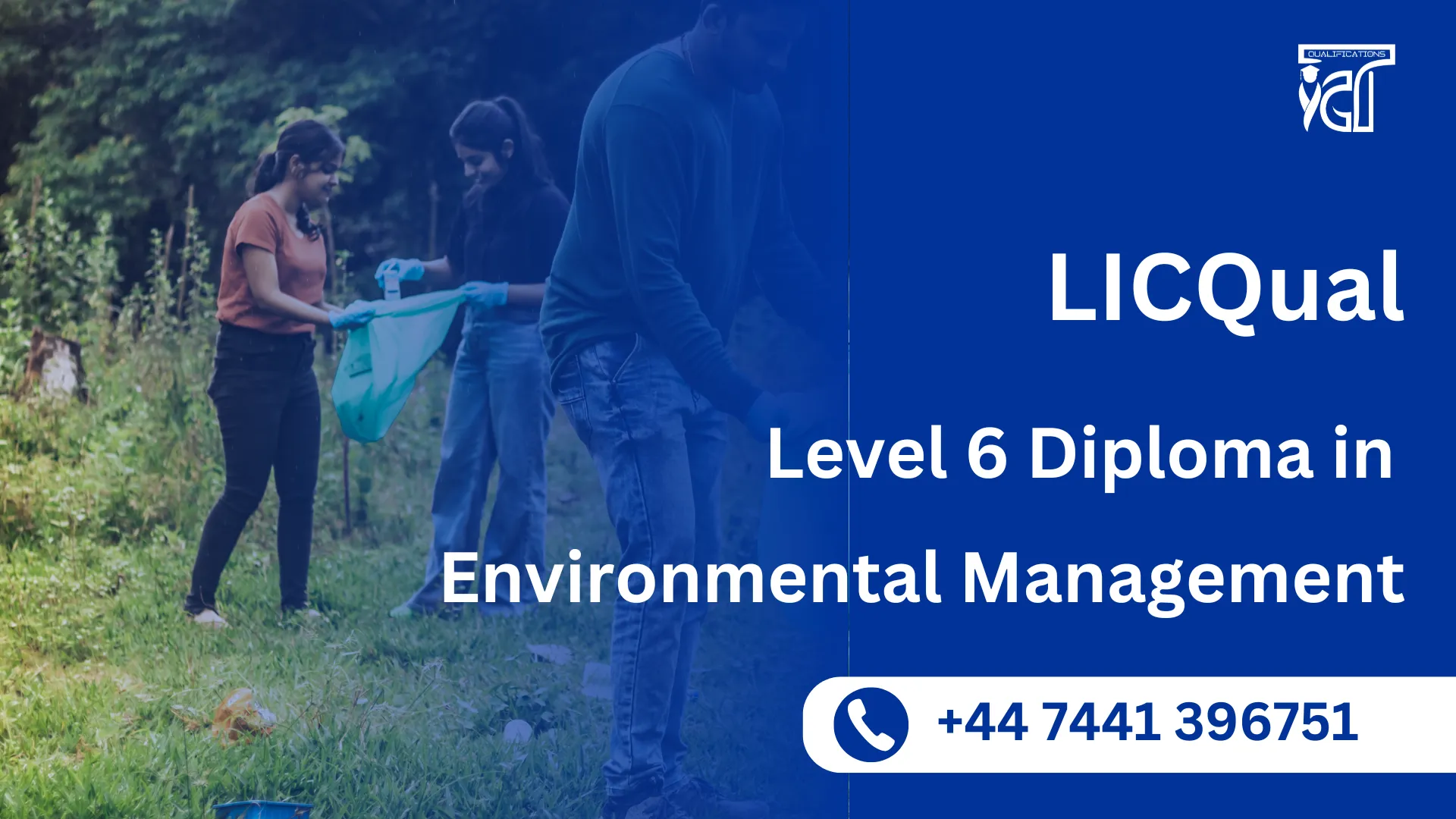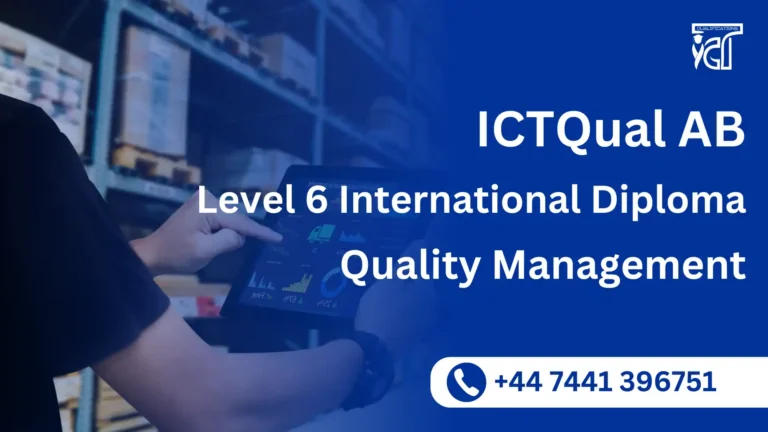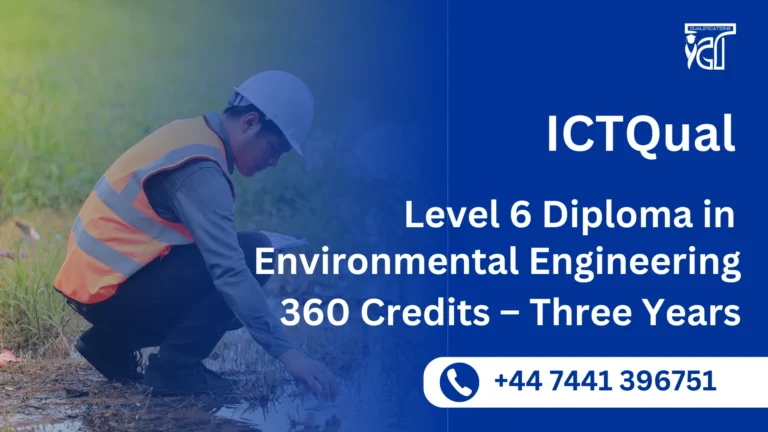In a world increasingly shaped by climate change, sustainability regulations, and corporate environmental responsibility, the demand for highly qualified environmental professionals continues to grow. The LICQual Level 6 Diploma in Environmental Management is a prestigious, Ofqual-regulated qualification designed for professionals seeking advanced expertise in environmental governance, policy, and leadership.
This diploma equips learners with the strategic and operational skills necessary to drive environmental performance, lead sustainability initiatives, and ensure regulatory compliance in complex industries. Whether you’re working in construction, energy, manufacturing, or public service, this diploma empowers you to take on senior roles and make meaningful environmental impact.
The LICQual Level 6 Diploma in Environmental Management builds upon prior knowledge and introduces advanced concepts essential for high-level roles in environmental and sustainability management. It explores strategic decision-making, environmental risk leadership, and the integration of sustainability into business operations and governance models.
This course is assignment-based, offering flexible, self-paced learning ideal for working professionals who want to enhance their qualifications without disrupting their careers.
As an Ofqual-regulated program, this diploma meets high UK and international standards. It is recognized by employers and institutions globally, making it a strong asset for career advancement.This diploma prepares professionals for leadership roles such as Environmental Director, Sustainability Strategist, Environmental Risk Manager, or Corporate Responsibility Consultant in both public and private sectors.
The LICQual Level 6 Diploma in Environmental Management is more than a qualification—it’s a powerful tool for environmental leaders who want to shape a more sustainable future. By mastering the complex interplay between environmental systems, policy, and business strategy, you’ll position yourself as a top-tier professional capable of influencing change on a global scale.
If you’re ready to lead the way in sustainability, environmental compliance, and green innovation, this diploma is your next step forward.
LICQual Level 6 Diploma in Environmental Management
Following are the mandatory units of LICQual Level 6 Diploma in Environmental Management:
| Unit Ref# | Unit Title | Credit | GLH |
| LICQ2200004-1 | Environmental Sustainability and Principle | 20 | 80 |
| LICQ2200004-2 | Global Environmental Issues | 20 | 80 |
| LICQ2200004-3 | Environmental Policy | 20 | 80 |
| LICQ2200004-4 | Environmental Policy issues | 20 | 80 |
| LICQ2200004-5 | Environmental Law | 20 | 80 |
| LICQ2200004-6 | The key environmental Units of International legislation and compliance measures | 20 | 80 |
GLH (Guided Learning Hours) and TQT (Total Qualification Time) are terms commonly used in vocational qualifications to help define the amount of time a learner is expected to spend on their studies.
1. GLH (Guided Learning Hours)
GLH refers to the number of hours a learner spends being directly taught, supervised, or supported during their course. This includes the time spent in activities such as:
- Classroom instruction
- Practical workshops
- One-on-one tutoring or mentoring sessions
- Online learning sessions with tutor support
In other words, GLH represents the time that learners are actively engaged with their instructors or learning activities.
2. TQT (Total Qualification Time)
TQT represents the total amount of time a learner is expected to invest in completing a qualification, including:
- GLH (Guided Learning Hours): Time spent on direct learning, as explained above.
- Self-Directed Learning: This includes time spent on independent study, research, assignment completion, preparation for exams, and any other work the learner does outside of direct teaching hours.
TQT is a broader measure that includes all the time required to achieve the qualification. It helps learners and employers understand the overall commitment required for the qualification.
Key Differences Between GLH and TQT:
- GLH focuses on direct learning with guidance or supervision.
- TQT includes GLH as well as independent study time and other learning-related activities.
Example:
If a qualification has a TQT of 600 hours and a GLH of 250 hours, it means the learner should spend 250 hours in direct learning (classroom, online, or tutor-led sessions) and 350 hours on independent study or research.
By the end of this course, learners will be able to:
Environmental Sustainability and Principles:
- Understand the core principles of environmental sustainability, including the balance between economic growth, environmental protection, and social equity.
- Analyze sustainable development models and their application across various sectors and industries.
- Develop strategies for integrating sustainability into organizational processes and practices.
Global Environmental Issues:
- Identify and critically assess major global environmental challenges, such as climate change, deforestation, and biodiversity loss.
- Evaluate the impacts of human activities on global ecosystems and resources.
- Propose innovative solutions and strategies for mitigating environmental degradation on a global scale.
Environmental Policy:
- Understand the formulation and implementation of environmental policies at national, regional, and global levels.
- Analyze how environmental policies influence business practices, governmental regulations, and societal behaviors.
- Develop the skills to create effective, evidence-based environmental policies that promote sustainability and environmental protection.
Environmental Policy Issues:
- Examine the key environmental policy issues that affect industries, governments, and communities.
- Assess the political, economic, and social factors that shape environmental policy decisions.
- Analyze policy challenges such as resource allocation, pollution control, and climate change mitigation.
Environmental Law:
- Understand the framework of environmental law, including legislation related to pollution control, waste management, and biodiversity protection.
- Evaluate the role of environmental law in regulating industries and holding organizations accountable for their environmental impact.
- Apply legal principles to real-world environmental issues and develop strategies for compliance with environmental regulations.
The Key Environmental Units of International Legislation and Compliance Measures:
- Study key international environmental agreements, conventions, and treaties, such as the Paris Agreement, Kyoto Protocol, and Convention on Biological Diversity.
- Understand the role of international bodies and organizations in shaping global environmental standards and regulations.
- Evaluate the mechanisms for ensuring compliance with international environmental laws and measures, and assess their effectiveness in promoting global sustainability.
Benefits of the LICQual Level 6 Diploma in Environmental Management
1. Globally Recognized, Ofqual-Regulated Qualification
This diploma is regulated by Ofqual, ensuring it meets the UK’s rigorous educational standards. It’s also internationally accepted, giving learners a competitive edge in the global environmental job market.
2. Advanced Strategic and Leadership Skills
The course equips learners with the skills to lead complex environmental and sustainability initiatives. Graduates are prepared to develop policies, influence executive decisions, and manage large-scale environmental programs.
3. Career Progression into Senior Roles
With a focus on leadership and strategy, this diploma is ideal for professionals aiming for positions such as Environmental Director, Sustainability Consultant, Corporate Responsibility Manager, or Environmental Compliance Lead.
4. In-Depth Understanding of Environmental Policy and Governance
Learners gain a strong grasp of environmental legislation, global policies, and sustainability governance—essential for compliance and strategic planning in any organization.
5. Practical and Relevant to Industry Needs
Through case studies, risk assessments, and real-world assignments, students acquire hands-on knowledge that directly applies to industries like construction, energy, government, and manufacturing.
6. Flexible and Assignment-Based Learning
This program is 100% assignment-based, allowing learners to study at their own pace without formal exams. It’s perfect for professionals balancing work, education, and other commitments.
7. Supports Environmental, Social & Governance (ESG) Goals
The course helps learners align their work with global ESG and sustainability frameworks, such as the UN Sustainable Development Goals (SDGs) and climate action initiatives.
8. Foundation for Further Professional or Academic Study
Graduates can progress to Level 7 Diplomas, postgraduate programs, or specialized certifications in areas like ISO 14001 Lead Auditing, carbon footprint analysis, or environmental risk management.
9. Develops Ethical and Sustainable Leadership
Beyond technical expertise, the diploma emphasizes responsible leadership, empowering learners to lead sustainability initiatives ethically and effectively in any organization.
10. Boosts Organizational Value and Reputation
Professionals with this qualification can help businesses improve environmental performance, ensure compliance, and enhance their brand reputation by implementing effective sustainability practices.
In summary, the LICQual Level 6 Diploma in Environmental Management offers high-level professional and academic advantages, making it an excellent choice for those ready to lead the charge in sustainability and environmental excellence.
This diploma is ideal for:
- Environmental professionals seeking to advance their expertise in environmental management, policy development, and sustainability.
- Mid-career professionals in sustainability or environmental roles who aim to transition into senior leadership or managerial positions.
- Individuals with a background in environmental science, law, or sustainability who are looking to deepen their knowledge and take on more strategic roles in environmental management.
- Policy makers and government officials who want to strengthen their understanding of environmental law, policy issues, and international legislation.
- Professionals working in industries such as energy, manufacturing, and corporate sustainability who want to enhance their ability to create and implement effective environmental policies.
- Consultants and advisors in the environmental field who wish to further their careers by acquiring advanced, internationally recognized qualifications in environmental management.
- Those passionate about tackling global environmental challenges and contributing to the development of sustainable, effective environmental solutions.
Entry Requirements
Register Now
Qualification Process
Qualification Process for the LICQual Level 6 Diploma in Environmental Management
- Self-Assessment:
Begin by evaluating your eligibility to ensure you meet the qualification requirements, including work experience, knowledge, and language proficiency. - Registration:
Complete your registration by submitting the required documents, including a scanned copy of a valid ID, and paying the registration fee. - Induction:
An assessor will conduct an induction to confirm your eligibility for the course and explain the evidence requirements. If you do not meet the criteria, your registration will be canceled, and the fee will be refunded. - Assignmnets & Evidence Submission:
Provide all assignmnets and the necessary evidence based on the assessment criteria outlined in the course. If you are unsure of the required evidence, consult with the assessor for guidance on the type and nature of evidence needed. - Feedback and Revision:
The assessor will review your submitted evidence and provide feedback. Evidence that meets the criteria will be marked as “Criteria Met,” while any gaps will be identified. You will be asked to revise and resubmit if needed. - Competence Evidence:
Submit final evidence demonstrating that all learning outcomes have been met. This evidence will be marked as “Criteria Met” by the assessor once it is satisfactory. - Internal Quality Assurance (IQA):
The Internal Quality Assurance Verifier (IQA) will review your evidence to ensure consistency, quality, and compliance with standards. - External Verification:
The IQA will submit your portfolio to LICQual External Quality Assurance Verifiers (EQA) for final confirmation. The EQA may contact you directly to verify the authenticity of your evidence. - Certification:
Upon successful completion of all checks, LICQual will issue your official certificate, confirming that you have attained the LICQual Level 6 Diploma in Environmental Management.






